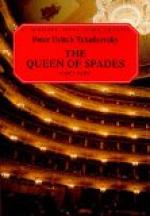|
This section contains 3,592 words (approx. 12 pages at 300 words per page) |

|
SOURCE: Brown, William Edward. “Alexander Pushkin as a Writer of Prose.” In A History of Russian Literature of the Romantic Period. Vol. 3, pp. 218-24. Ann Arbor, Mich.: Ardis, 1986.
In the following essay, Brown explains the relationship between Pushkin's The Queen of Spades, Ezersky, and the narrative poem The Bronze Horseman.
The Queen of Spades1
Pushkin's most successful completed short story, The Queen of Spades, was written in 1833, during his “second Boldino autumn,” and published in the following year. During this same period he was working on the uncompleted second “novel in verse,” Ezersky, and the last of his narrative poems, The Bronze Horseman. Among these three pieces, in different genres, there is a fascinating and puzzling kinship. Hermann, the methodical and monomaniacal German who is the hero of The Queen of Spades, was first conceived as a character of a quite different sort—a dreamy romantic, in love...
|
This section contains 3,592 words (approx. 12 pages at 300 words per page) |

|


